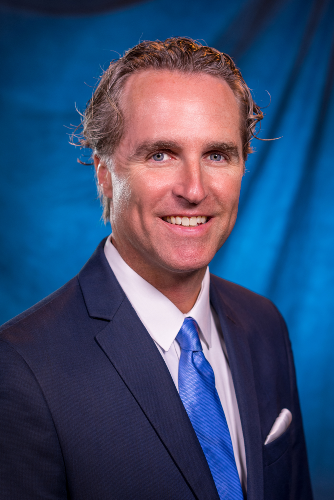The Cincinnati-based grocery chain, founded in 1883, placed No. 9 on this year’s list of largest private-sector employers locally, down from No. 5 in 2020. Kroger ended 2020 with $2.6 billion in net income on $133 billion in revenue, up from $1.6 billion in income on $122 billion in sales in 2019.
Its total number of employees grew from 435,000 full- and part-time workers at the onset of the pandemic in February 2020 to 465,000 at the beginning of 2021. The company is hiring for nearly 2,000 full- and part-time positions in Los Angeles County and surrounding areas.
The Business Journal talked with John Votava, director of corporate affairs at Kroger’s Ralphs Division, and Vanessa Rosales, who serves in the same role for Food 4 Less Division, about the company’s challenges and strategies for operating safely during the ongoing pandemic.
How many stores and employees do you have in L.A. County?
John Votava: We have 14,600 associates for Ralphs and Food 4 Less in L.A. County at our retail stores, manufacturing and distribution centers, and at corporate offices. Ralphs has 94 stores, and Food 4 Less has 50.
What challenges has your company faced during the pandemic?
JV: As an essential business, we remained open throughout the pandemic to serve our communities with access to fresh food and essential items. Our team implemented dozens of safety measures to protect our associates, customers and communities from the onset of the pandemic through today.
How have you tackled those challenges differently in the last few months versus the start of the pandemic?
JV: The safety of our associates and customers has always been our first priority. We remain vigilant in providing masks for associates and customers, sanitizing surfaces regularly and promoting social distancing in break rooms and back offices.
We offer a $100 payment for associates who receive the vaccination, and we provide ample vaccination clinic opportunities for the well-being of our associates and customers.
How is your company handling Covid safety protocols such as distancing in the office and stores, Covid vaccinations and Covid testing? What are you requiring versus suggesting?
JV: From the beginning, we provided masks and gloves; installed plexiglass barriers; floor decals for customer physical spacing; changed layouts in breakrooms; temperature checks and Covid testing for associates; vaccination clinics for associates and customers; and dozens more protocols to protect the safety of our associates, customers, and
communities.
How have you changed — or do you expect to change — your physical location setups?
JV: After more than a year and a half, most changes have become fairly permanent for now, and we’ll assess any updates over time.
Have you changed your employee benefits in the past year to accommodate employees’ changing needs or to compete more effectively in the current market?
JV: Yes. Our comprehensive benefits package includes $2 per hour extra pay and rewards for our associates that were paid out throughout the pandemic, $100 payments to encourage receiving the vaccine, paid sick leave, parental leave, mental health resources, child care assistance and more.
What has been your biggest takeaway from an HR or management perspective during the course of navigating the pandemic?
Vanessa Rosales: During this past year, both HR and management have worked tirelessly in support of our associates during the pandemic. HR has excelled in providing support to the operations team and senior leadership throughout the crisis in an ever-changing environment. Everyone learned to pivot, improvise and improve every day our day-to-day processes.
How would you characterize your company’s year?
VR: The year, as for everyone else, was one of uncertainty, but it also brought out the best in our associates. Since the start of the pandemic, we’ve expanded our supply chain, enhanced cleaning procedures in our stores and hired more than 100,000 new workers nationwide to reinforce our continued focus on associate and customer safety. Our plan is to stay the course and continue to improve on this every day.
What trend(s) in your industry or among your staff’s needs are you monitoring going into 2022?
VR: We’re seeing several trends among shoppers and our associates, including a sustained trend of consumers opting to cook at home versus dining out because it helps them stretch food dollars, eat healthier and prepare household favorites as well as new recipes.
Shoppers are increasingly dictating how, when and where they want to interact with
grocery retailers and seeking delivery options. Kroger recently announced 30-minute delivery through Instacart, available at Ralphs and Food 4 Less locations in L.A. County.
Are you looking to increase staff here in the L.A. region? What are some efforts you put in place to meet your staffing needs?
VR: Propelled by steady growth, Ralphs and Food 4 Less are currently hiring for nearly 2,000 full- and part-time positions in Los Angeles County and surrounding areas, at company’s retail stores, manufacturing facilities and distribution centers. As an industry leader, Ralphs and Food 4 Less, offer resources, benefits and training to help our associates thrive, including top-tier health and retirement benefits; competitive wages; discounts on groceries, electronics, entertainment streaming services (and) travel; as well as on-demand, role-specific training and resources.
Have you launched or expanded upon programs to promote diversity and inclusion internally, and what changes have those efforts brought about?
VR: Last October, Kroger launched our new Framework for Action: Diversity, Equity & Inclusion plan across all the Kroger family
of stores. It reflects our desire to redefine, deepen and advance our commitment,
mobilizing our people, passion, scale and resources. The plan features five focus areas: Create more inclusive culture, develop diverse talent, advance diverse partnerships, advance equitable communities, and deeply listen and report progress.

